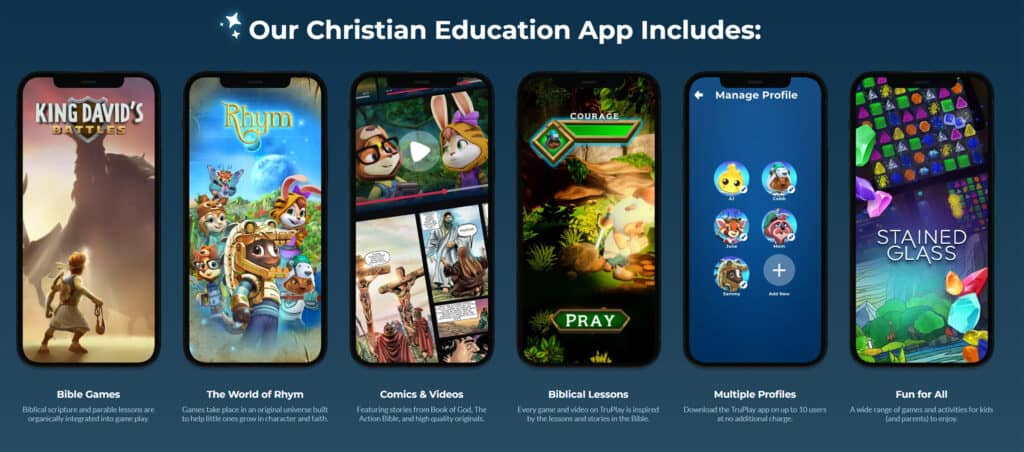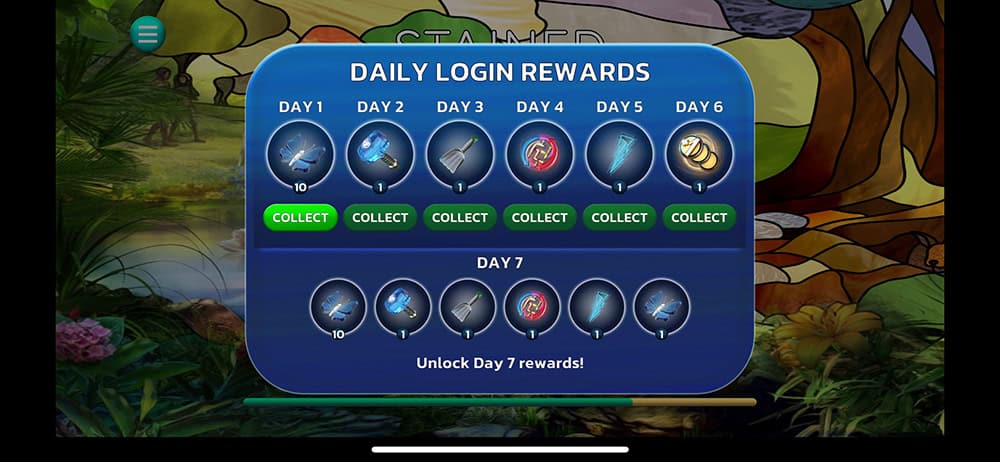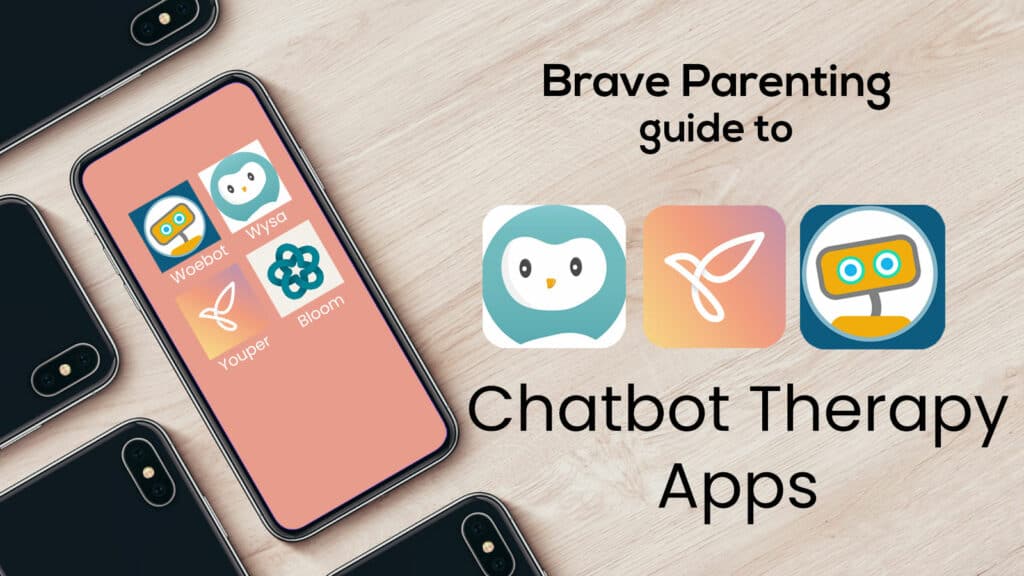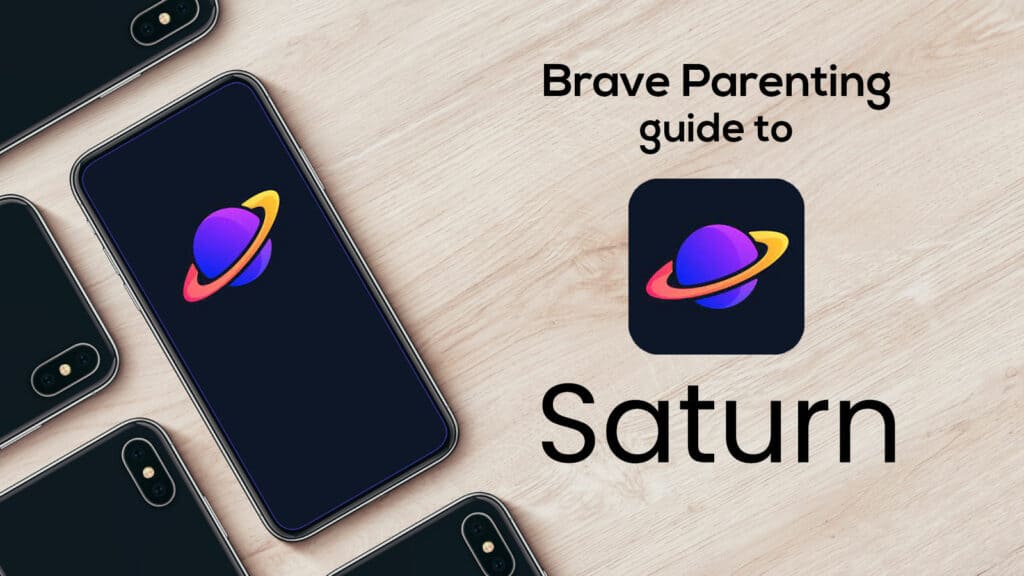Check out our podcast episode on TruPlay: Can God be Gamified?
TruPlay is a video game app “where fun meets faith.” Truplay believes that everyone should have the opportunity to play safe, high-quality, faith-building multimedia.
The mission behind TruPlay is “to transform generations of children in such a profound way that it will shape culture.” The website claims, “At TruPlay, we’re building a beautiful, fun, world-class entertainment platform which invites children into a world of hope and God’s truth.”
Here are the five facts about TruPlay that you need to know:
#1 TruPlay Basics
TruPlay offers faith-based video games for children aged 4 to 12.
It’s available on iOS and Android devices through the App Store and Google Play. TruPlay accounts are accessible on up to ten different devices with a subscription.
They boast no ads, no chatrooms, and no in-app purchases – which is awesome! Their Privacy Policy states that they don’t utilize any push notifications. Although notifications are requested to be allowed during app setup, we never received one during our weeks of research.
While they offer “fun for the whole family,” the user interface does not promote or facilitate parental previewing or co-viewing. Two pieces of evidence:
-
“Just hit Play and hand the device over.”
This seems to say, “Parents, you don’t need to preview this content…we’re faith-based after all….just hand the device over.”
Obviously, for the biblical lesson and value to translate from the screen to real life, the content must be reinforced through conversations with their primary disciple-makers. How can parents do this if they don’t know what lesson or principle is taught?
-
All games require headphones or earbuds to listen to the narration or sounds.
Parents cannot even co-listen to the content unless they use one earbud while their child uses the other.
Again, how can parents reinforce the real-life application of God’s word if they cannot hear what is taught?
#2 Content
“Immerse your kids in high-quality games, comics, and animations that bring the Bible to life, teaching courage, character, and God’s truth in ways kids love.”
They claim to accomplish this through:
All of these, the website argues, “turns game time into God time” in a “sanctuary of uninterrupted play.”
Let’s examine one game (we could look at many) to see how effectively it teaches Christian values and virtues.
Ava & the Mirror of Truth
The description of this game reads: Launch into puzzles with Ava to discover how God’s truth fights against the lies we believe about ourselves.
The scene opens with Ava and her friend walking up into an Angry Birds-like arena as she asks, “What is a Snarfon anyway?” Her friend answers, “Lying scoundrels.”
The Snarfon then begin making fun of Ava and state their goal to make her cry.
What is Ava to do when the Snarfon are saying mean things and trying to make her cry?
Ava launches STOP signs at the Snarfon to destroy them.
And promptly received a “Nice Job!” affirmation and a high score.
Is that not supporting using physical violence against words? Ava doesn’t use God’s truth to confirm who she is in Christ, thereby silencing the lies of the Snarfon. Instead, she stops them by launching projectiles to destroy them.
We struggle to identify what biblical lesson or virtue this teaches children. There is great room for improvement in this game, perhaps by incorporating verses such as Luke 6:28: “Bless those who curse you.”
#3 Biblical Veracity
The company’s website lists seven employees, a five-member advisory board, and two team chaplains. None of those listed serve in any capacity to confirm biblical accuracy. Equally, none appear to hold a Seminary Degree, a Master of Divinity, or a Master’s degree in theology or the Bible.
On the website’s FAQ, they acknowledge the question of how parents can know that they are trustworthy. To this, they confirm their belief that the Bible is inspired, authoritative, and inerrant. Because the progressive Christian movement denies these attributes of Scripture, this is a helpful and necessary attestation.
Additionally, they boast approvals and endorsements from some of the leading organizations in the Christian Community: the Billy Graham Evangelical Association, Promise Keepers, Sam Rodriguez, PluggedIn by Focus on the Family, and Candace Cameron Bure.
We identified a few areas of concern, however.
-
The use of the word “Mindfulness.”
Mindfulness is the word used for secular meditation. It’s associated with emptying the mind to find inner peace (Buddhist roots). Christian meditation is about filling your mind with God’s word and finding peace in Christ alone.
-
Prayer as a magic wand.
Throughout several games and comics, prayer is used as a last resort rather than a first step. After the characters pray, the solution miraculously occurs. No faithful waiting, no suffering, no perseverance required. It walks a fine line of “name it and claim it.”
-
Children are their own authority
We found no narrative within the games that places the animal children under the authority of parents (where it belongs). Instead, there are blatant instances and insinuations of rebellion.
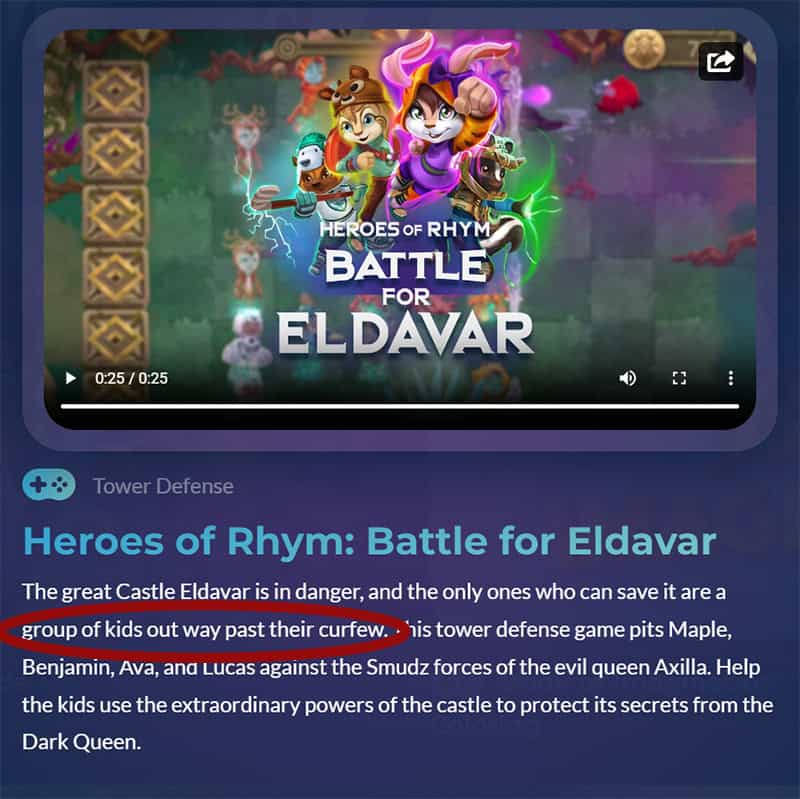

Honoring your father and mother (Exodus 20:12, Ephesians 6:2-3) and obeying governing authorities (Romans 13:1-7) are critical biblical themes for children to learn. These seem to be overlooked in the name of childhood adventure.
#4 Financial Cost
TruPlay offers a 7-day trial, after which a subscription costs:
Annual plan: $69.99/year
Monthly plan: $12.99/month
In the FAQ, the company addresses the question of why it charges a subscription. “…we are part of a greater movement to provide high-quality, beautiful content to everyone who wants redemptive digital entertainment. In order to continually produce high-quality content to our audience we invest in top talent and set a high bar for quality, which takes significant resources.”
More on this under Biblical (Business) Consideration below.
#5 Age Rating & Review
TruPlay: Age 4-12
Apple App Store: 4+
Google Play: Everyone 10+
Brave Parenting: Children 10+ who profess faith in Jesus Christ; played in a public setting in the home with time limits
Why do we recommend 10+ for a Bible-based video game? Shouldn’t this be allowed at earlier ages? Two primary reasons why we recommend 10+:
(1) Discipleship
Discipleship is the process by which one believer walks alongside a younger believer in Jesus Christ and teaches them how to know, love, and obey the Lord. Deuteronomy 6:7 and Ephesians 6:4 place this responsibility solely on parents. The family is the institution that God established for children to learn about Himself and His Son, Jesus Christ. In the family, they learn how to love others and to obey all that God has commanded. The next institution for discipleship is the church, the body of believers in community that likewise walk alongside children as they grow.
Christians must recognize that new technologies such as social media and gaming apps are working to establish themselves as an institution for discipleship. Granted, TruPlay at least professes to teach godly virtues and biblical truths. But make no mistake, every bit and piece of new media technologies aims to disciple in some way. Typically, it disciples users into secularism or transhumanism; rarely does it disciple into Christianity.
We do not doubt TruPlays’ altruistic intentions to create quality (“world-class”) gaming entertainment as a better alternative to the vileness available otherwise.
That said, online video games are not an institution for discipleship.
While the company uses the language of “nurturing” and “growing” a child’s faith rather than “discipleship,” it nevertheless plays right into modern parents’ weakness to abdicate their role to the screen.
Children must learn about God, His holy Word, and the gospel of Jesus Christ through the embodied presence of faithful believers—life-on-life and face-to-face relationships. If this is done throughout childhood, by age 10, a child professing faith in Jesus Christ will have a firm foundation and be less likely to see learning about God as mere entertainment.
Moreover, we do not recommend that any child play video games before the age of 10, as this allows them to have the free play necessary for building character and resilience during childhood.
(2) Gamified Behavior Modification
TruPlay doesn’t employ algorithmic gamification, like games such as Minecraft or Roblox do. However, any form of gamified behavior modification in learning about God trains a child to expect learning about God to be fun, stimulating, and virtually rewarding.
Gamifying God so that children can learn about Him in a way that is “fun for them” caters to children as the authority. Even worse, gamifying God debases the Gospel to a gimmick.
Truplay utilizes the same “rewards” that most non-Christian games use to encourage children to continue playing. They offer daily login rewards, high scores, leaderboards, daily missions, and shops where in-game currency can be spent. Some will argue that this is just the way games are today. Even if that is true, this does not mean it should be or that parents must passively accept this reality for their children.
Do we really want to teach our 4-12-year-olds to be “immersed” in the “endless” joy of video gaming so they can learn about Jesus in a fun and engaging way? Is the “sanctuary” we desire for our children that of “uninterrupted play”?
Biblical (Business) Perspective
At the heart of TruPlay is business. To be clear, we find no problem supporting Christian businesses that operate for profit. We believe we need more Christian businesses in the marketplace!
However, TruPlay does not appear to be a mom-and-pop start-up, nor is it a ministry. Their website lists an employee in charge of Investor Relations, and their contact form offers the option to contact either Support or Investor Inquiries.
Therefore, as an investor-backed business, everything they do is ultimately subject to the interests of their investors. They may all be Christians, but in the end, their business model operates in the same economy as YouTube, Minecraft, and TikTok: the economy of capturing children’s attention.
Attention is a highly sought-after and lucrative commodity. To capture a child’s attention is to capture their affection. And in a culture oversaturated with screens and overstimulated with entertainment, the risk of a child’s affection being captured by the screen or entertainment itself, instead of Jesus, is one that Christian parents must deeply consider.
Therefore, we encourage the Christian community to err on the side of DELAY and LIMIT all online media and technology for children. This includes biblical content like TruPlay.
No one ever regrets allowing their children to have a play-based childhood rich in relationships and embodied experience. Most parents, however, regret allowing too much online media and entertainment too soon.
*All quotations are taken directly from TruPlay’s website, app description, or the app itself.
**We reached out to TruPlay for clarification on their claims to grow a child’s faith and aspects of the user experience. We received no response before our publication deadline.




